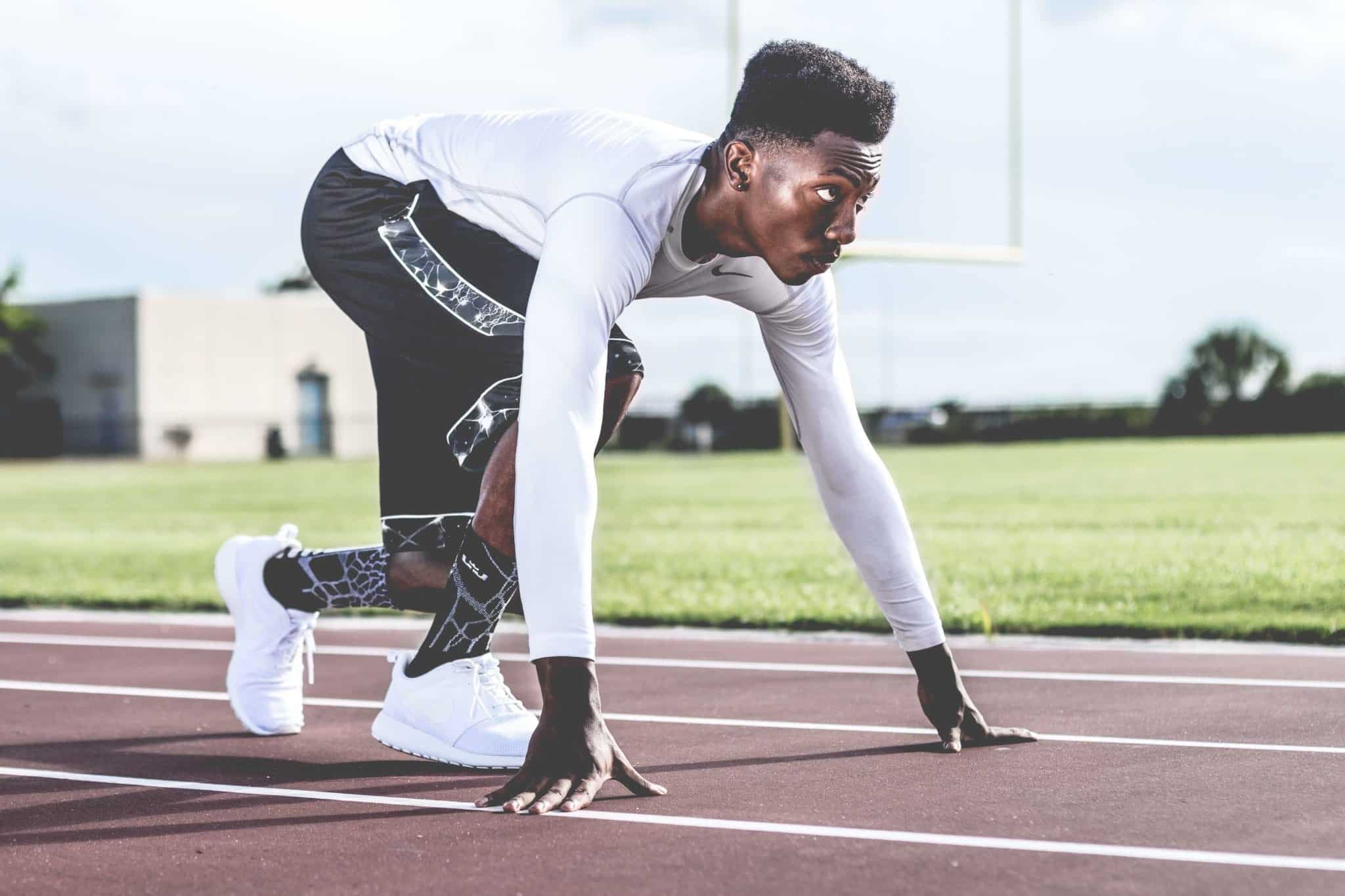Professional athletes train 20–30 hours a week the whole year round while eating healthy and facing the pressure for a great athletic performance. Similarly, student or collegiate athletes train at least eight hours a week while keeping up with their academics. The life of an athlete is not easy: discipline, perseverance, hard work, passion, and determination are only a few of an athlete’s values.
With all the exercise, healthy living, clean eating, and strong personality, athletes are perceived as physically, emotionally, and mentally strong individuals. However, the mental wellness of athletes often takes a hit from a number of stressors, such as the pressure of career achievement, concerns about athletic performance, the fear of being injured, and for student-athletes to keep up with classwork and grades.
If you’re a student athlete, an elite athlete, a coach, or an athlete’s family member, and you’re trying to search for answers to mental health concerns, this article can help shed light on the topic.
Why the Mental Health Issues of Student Athletes and Elite Athletes Matter
About 33% of the student or collegiate athletes experience symptoms of depression and anxiety, while 35% of elite athletes (players for Olympics or national sports events) experience stress, depression, anxiety, eating disorders, and other mental health crisis.
Athletes are looked upon as role models by their fans and peers. As athletes keep up with the facade of being strong and exemplary role models, they tend to hide what they really feel or what they go through. There are two apparent reasons athletes wouldn’t seek help for their mental wellness: the stigma of being judged and the fear of being taken off the team.
But when an athlete’s emotional and mental health is not taken care of, it will be reflected in their game performance. The lack of concentration due to mental health issues can either result in losing the game or getting injured. Athletes trying to be in a certain weight category like boxers may develop eating disorders, which can greatly affect their physical health.
This is why mental health is important for athletes. It affects almost all aspects of their lives.
Why Are Student Athletes Prone to Mental Health Issues?
Student athletes in high school or college are prone to mental health issues for many reasons:
- The pressure of having good grades and keeping up with deadlines at school is too heavy for them.
- Along with the desire to stay physically fit (like cheerleaders), some student athletes develop eating disorders.
- High school athletes work hard to have good grades and perform well in their respective sports with the hopes of qualifying for a full-ride college scholarship.
- Lack of sleep due to waking up early in the morning for training or staying up late at night to finish school work will increase stress levels and may lead students to develop depression or anxiety.
- An athlete suffering from a serious injury with the worries of not being able to play again may develop depression.
- The pressure of not meeting the expectations of their coaches, parents, or school stresses them.
- Due to busy schedules in training or practices, there may be a lack of social interaction with their peers, causing them to feel lonely or isolated.
Why Are Elite Athletes Prone to Mental Health Issues?
Elite athletes are highly vulnerable to mental health challenges. They may experience many stressors on a regular basis. Professional athletes play sports as their career, and they make a living out of this, so the pressure can be really heavy. Here are the reasons why elite athletes are prone to mental illness:
- Athletes experiencing problems keep their problems to themselves because of the stigma of seeking help for their mental health. There is the fear that it may affect their career. This worsens the problem and may lead to the development of symptoms of depression.
- They have to constantly deal with the pressure of performing well and becoming a better athlete to maintain their career or to progress to the next level.
- When the athlete is injured, there is the fear that they will not be able to come back to play, which will affect their career.
- They lack social relationships because of being too busy with the training and games.
- The fear of losing their job and facing financial instability burden them mentally and emotionally.
What Coaches, Sports Organizations, and Families Can Do to Help Improve the Mental Health of Athletes
Coaches, sports organizations, schools, and families should try to offer support to the athletes. Some athletes will not openly admit to experiencing mental health issues, so the aforementioned groups should be aware of the mental health problems among athletes.
How will you know if an athlete is experiencing struggles with their mental health? Know the signs of a mental health decline or mental illness before things get worse with the athletes under your care.
- Changes in eating patterns (may eat too much or less). You’ll know an athlete is eating lesser than usual when they don’t have their typical energy for training.
- Changes in sleeping patterns. The change can be in the form of oversleeping or lacking sleep. It can show in their performance during training or the game.
- Changes in their personal self-care. Are there changes in their hygiene? Are they unkempt as compared before?
- Changes in mood. The athlete displays dramatic emotional changes, mood swings, extreme anger, or depressed feelings.
- Social withdrawal. Has the athlete stopped socializing? Have they stopped joining the team for after-practice dinners? Do they now prefer to stay alone and appear aloof?
- Changes in everyday functioning. The athlete cannot cope with everyday tasks, like house chores, school work, or join family gatherings, which seems unlikely as before.
- Problems in concentration. They areunable to concentrate well during practice or the game, affecting their athletic performance.
- Unusual behavior. They start acting odd, appear to be sad, and do not like doing activities once enjoyed before.
If you see one of these signs in an athlete you know, try to step in. As a coach, parent, or co-athlete, offer your support by talking to them. Your presence and availability to listen with empathy are more than enough.
Sometimes, all we need is someone who will listen to us. Someone we can talk to without judgment. Athletes need this, too.
How Athletes Can Take Care of Their Mental Health
Most athletes we know, elite or students, have that strong-willed and passionate character. But like most of us, when pushed to the limits, athletes can have a breaking point.
Elite and student athletes should try to keep in mind that as they do their best to be physically fit for a sports event, they should also be mentally prepared by taking care of their mental health. Here are some pieces of advice to follow:
1. Talk to a Friend
Sometimes, all you need is a trusted friend you can talk to. Have you noticed that you feel better after you talk to a friend about a problem or your challenges? When you express your emotions and what’s bothering you, you are taking care of your mental health. Talk to a friend who sympathizes with you and listens to you without judgment. Talking to a friend can also help with your sense of belongingness, self-confidence, and anxiety reduction.
2. Set Aside Time for Yourself
When was the last time that you gave time to yourself? Have you been busy with all the training and games? When was the last time you had a pamper day or just took time off?
Sport Psychology suggests that even Olympic athletes take occasional rest days in between training, and so should you. Elite athletes or student athletes should set aside time for themselves to relax and do what makes them happy (other than training or playing sports). If you find it helpful to go camping outdoors or gardening makes you happy, then do it.
3. Socialize with Family or Friends
Social relationships are important for mental health. The sense of belongingness by spending time with your friends and family has a big role in your mental well-being.
Going out on coffee dates or having drinks is good for your mental health. It’s the perfect time to catch up, laugh, and let loose. Everybody needs to socialize to develop healthy relationships, which can help you destress and avoid conditions like depression or burnout.
4. Practice Mindfulness Meditation
Are you getting stressed in between training and athletic games that you feel like freaking out? Practice mindfulness meditation as one of your coping skills. Practicing mindfulness meditation with deep breathing exercises can help you increase concentration during games and is a great exercise for better mental health.
Final Thoughts
One of the best things you can do for better mental health is to speak with a counselor or therapist. A mental health professional can help you get an insight into what you’re feeling and why you’re feeling this way. If you’re from Kentucky or Ohio, you can avail the telehealth care services of Kentucky Counseling Center (KCC). Schedule an appointment now through the KCC Direct Services.




